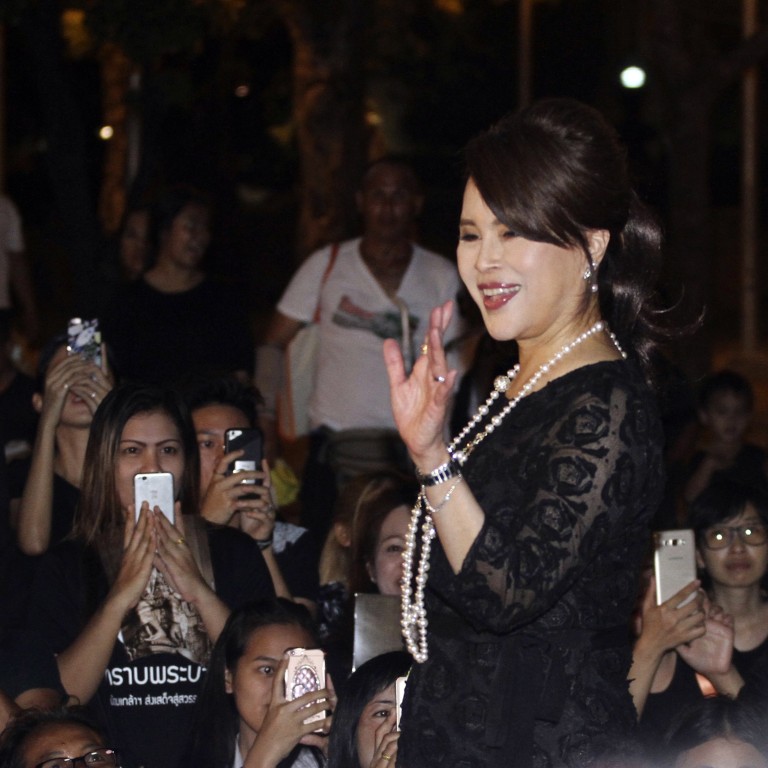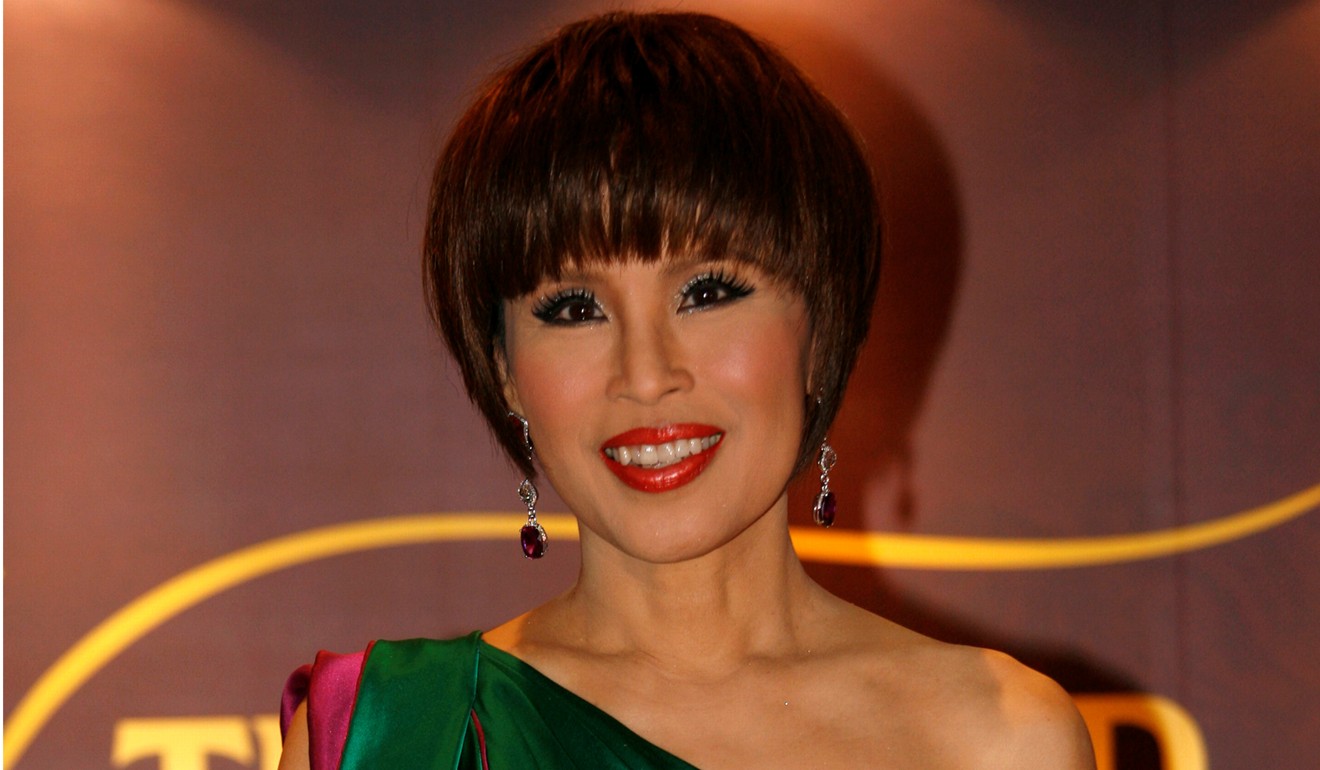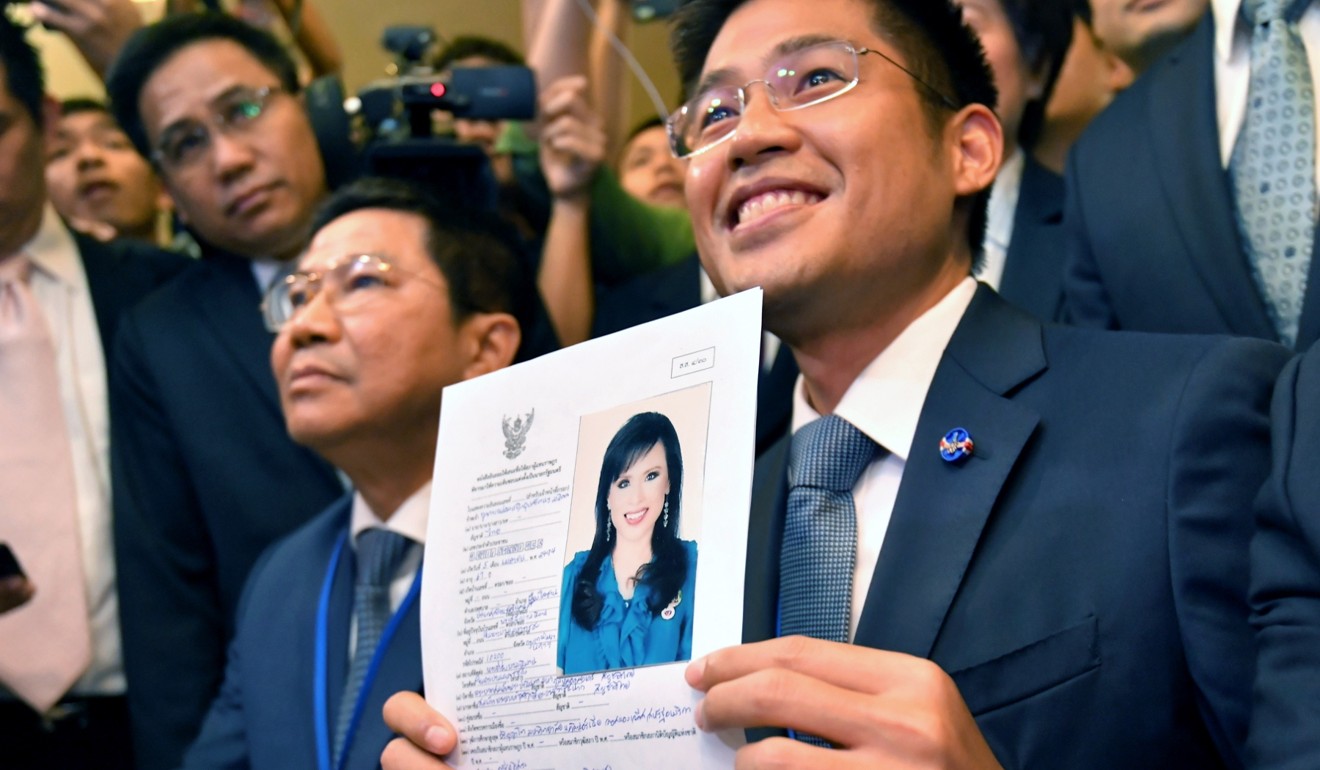
Thailand’s Princess Ubolratana’s bid to become prime minister doomed after party complies with king’s decree
- King Vajiralongkorn chastised Ubolratana, describing her move as ‘inappropriate’ and against the constitution and royal norms
“Thai Raksa Chart party complies with the royal command with loyalty to the king and all members of the royal family,” the party said in a statement.
“The Thai Raksa Chart will carry out its duty in accordance with the regulations of the Election Commission, the election law and the Constitution with respect to the tradition related to the monarchy. We are ready to bring forward policies that will lead Thailand to prosperity, with respect for the people’s decision in accordance with the principles of the democracy with the king as head of state.”
The party added that it was grateful to Ubolratana for her kindness.
Although the final decision on the admissibility of Ubolratana’s candidacy lies with the election commission, the king’s decree is likely to weigh heavily on the commission members’ minds when they deliberate on the matter.
Jarungwit Phumma, a member of the ruling junta who leads the election commission, said on Saturday that a final decision on the princess’ candidacy will be announced on Monday.
Thai Raksa Chart is one of several political parties aligned with the Shinawatras that are contesting the March 24 polls – the first since the 2014 coup.
Thai election: can Shinawatras keep it in the family, again?
The princess’ involvement was an unprecedented move: the first time a royal had entered politics since the end of absolute monarchy in 1932.
As the day ended, however, Maha Vajiralongkorn all but extinguished that possibility. In a late-night statement he chastised Ubolratana, describing her move as “inappropriate” and against the constitution and royal norms.
“The palace disapproval invalidates her candidacy,” said Puangthong Pawakapan, professor of political science at Chulalongkorn University, before the Thai Raksa Chart announcement.
Ubolratana has relinquished royal titles except for the right to be called princess but Maha Vajiralongkorn said she remained part of the reigning Chakri dynasty.

The siblings are the children of late Bhumibol Adulyadej, who died in 2016 after a record-breaking 70 years on the throne.
“All royal family members adhere to the same principles … and cannot take any political office, because it contradicts the intention of the constitution,” Maha Vajiralongkorn said.
Commentators who on Friday assumed Ubolratana’s bid had the blessing of her brother – the siblings were believed to be close – were at a loss for words following the king’s rebuke.
Facebook: Ban on foreign ads before Thai poll not due to junta request
“These developments are wild and completely unexpected,” Tom Pepinsky, a Southeast Asia researcher at Cornell University, told the Post on Saturday.
In a commentary published hours earlier, Pepinsky wrote that Ubolratana’s candidacy was “much more momentous than, say, [Britain’s] Prince Harry running for office”.
Much of the analysis about developments over the last two days has been speculative, given the opaque nature of palace machinations. Commentary among local analysts meanwhile has been muted due to the country’s strict lèse-majesté rules prohibiting criticism of the royals.

Joshua Kurlantzick from Washington’s Council on Foreign Relations suggested the U-turn on Ubolratana’s candidacy may have to do with a political “deal” struck by the exiled former prime minister Thaksin Shinawatra and his sister Yingluck – also a former premier – that had gone awry.
He suggested two scenarios: one in which the royal court had decided against approving Ubolratana’s candidacy at the last minute, and another in which the king was unaware of his sister’s plans until Friday’s announcement.
Thai junta chief faces tough transition if he wins election
The princess accepted the nomination of the Thai Raksa Chart party – one of several parties linked to Thaksin and his sister Yingluck – meaning, the candidacy would at least have needed the telecom-tycoon-turned-politician’s endorsement.
Thai Raksa Chart was created as part of a strategy to diversify the clan’s political assets in case its main vehicle, the Puea Thai party, was dissolved by the junta that deposed the government Yingluck helmed from 2011 to 2014.
The nomination of a royal family member by pro-Thaksin forces was an audacious gambit, potentially undercutting Thaksin’s ardently royalist foes, and setting up an election showdown with Prime Minister Prayuth Chan-ocha, who led the 2014 coup and heads the military government.
But King Vajiralongkorn’s swift rebuke of his sister’s bid could backfire on pro-Thaksin forces, who could face retribution if judged by election authorities to have tried to illegitimately use a royal connection.
Thai election: youth tire of army rule and seek to reshape their country’s politics themselves
“Friday’s events were astounding and have people completely rethinking their assessments and perspectives and the country’s future political trajectory,” said Jay Harriman, senior director at BowerGroupAsia, a government affairs consultancy.
“The monarchy has semi-divine status in Thailand. Public appearances and statements often pertain to royal duty or events. A disagreement like this has almost never happened in recent memory.”

Ubolratana, who on Friday wrote on Instagram that she was a “commoner” who does not enjoy royal privilege, on Saturday uploaded another post that appeared to ignore her brother’s rebuke.
“Thank you to all Thais for the love and kindness you have shown,” she wrote in a caption accompanying a picture of herself. She said she “sincerely wished” to see the kingdom progress and for people to enjoy unfettered rights, opportunities and happiness.
The princess and the Thai Raksa Chart had not responded to the king’s statement but the party did cancel a campaign event scheduled for Saturday.
Thailand’s military rulers seek to curtail support for Shinawatras and their allies
Ubolratana, a mathematics and biochemistry graduate from the Massachusetts Institute of Technology, has a reputation for being more accessible to commoners than the rest of the royal family.
Observers have said she has in the past hinted that her political allegiances lie with the Shinawatras, whose political clout draws heavily on support from the country’s northern, Laos-influenced region.
News agency AFP noted in a profile of Ubolratana on Friday that her post accepting Thai Raksa Chart’s nomination for prime minister candidate featured her wearing a traditional dress from that region. She was also holding red flowers – the colour that has come to represent Thaksin’s supporters, known as “red shirts”.

